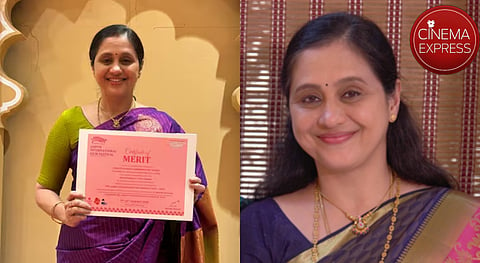

They say, “Life comes full circle,” and for actor Devayani, this adage recently became a reality. Having spent years in front of the camera, the versatile actor stepped behind it for the first time, directing Kaikuttai Rani, a short film that won an award at the Jaipur International Film Festival. Reflecting on her favourite aspect of filmmaking, she shares, “I conceived an idea, shaped it into a story, and put it down on paper. Watching those words come to life on set was fascinating,” she says, adding that the actors breathed life into the character just as she has done all these years. “Another magical experience was seeing the film take shape in the editing room—deciding what stays and what goes. The journey from script to screen is an indescribable joy.”
In this conversation, Devayani speaks about her filmmaking experience, her career, her definition of the word ‘homely’ and more.
How did your experience as an actor differ from your experience as a director? What were some challenges you endured in the process?
As an actor, everything is set up for me—I arrive on set, and the scene is ready. Over time, I became used to this ease. But stepping into filmmaking turned the process upside down. Acting is second nature to me, but filmmaking requires planning every detail beforehand. As the captain of the ship, I had to lead the team, manage resources, and stick to the schedule. This journey taught me invaluable lessons in filmmaking, resourcefulness, and problem-solving.
What was it like working with a child artist in your directorial debut?
Niharika, the protagonist of my short film, is an incredibly talented child artist. I had previously worked with her on Nizhal Kudai and was deeply impressed by her performance. On that set, I jokingly told her I would introduce her in a lead role—and it turned out to be true.
Working with her was effortless; she has a natural instinct for acting. I feel lucky to have worked with someone as gifted as Niharika.
Tell us about working with Ilaiyaraaja for Kaikuttai Rani. What is your earliest memory of working with him?
It was an honour just to get an appointment and meet Raja sir. Throughout my career, he has composed music for so many of my films, but this meeting felt truly special. I showed him my film, and without hesitation, he agreed to compose music for it. I consider that my greatest blessing.
In the early days of my career, I worked on Senthooram, which I believe was my first film with Ilaiyaraaja sir’s music. The director was new, and so was I. For the film’s publicity, a full-page newspaper ad featured my black-and-white portrait, with only the bindi (senthooram) in red. Raja Sir’s photo was placed alongside the title, making it a memorable moment. He later composed for my next film, Poomani, and those remain my earliest memories of working with him. Although I had collaborated with him before and seen him at award functions, this was my first one-on-one meeting with him as a composer. I took my daughter along, and she received his blessings. When I narrated the story to him, he instantly connected with the film’s theme. And as soon as he watched it, he immediately started working on the music. It was a surreal and deeply fulfilling experience.
Do you think the film industry’s perception of married female actors has evolved over the years?
Judgement and prejudice against female actors have always existed. The moment a woman gets married, she is often demoted from a lead actor to a supporting role—that’s exactly what happened to me when I took up Kolangal. I accepted it as a reality, knowing there was no point in complaining. However, today, many young women are tying the knot and still securing significant roles in their careers. Perhaps the industry is changing for the better. Marriage should never be a full stop for female actors.
You were named ‘homely heroine’ after the success of Kaadhal Kottai. Do you think the word ‘homely’ is still relevant for today’s female actors?
Kadhal Kottai changed my life. After playing Kamali, I was only offered character-oriented roles. I consciously chose not to take up glamour roles after that film. Even today, if filmmakers choose to, they can create homely heroines. Our culture, with its traditions—women wearing bindis, adorning their hair with flowers, and dressing in cultural attire—naturally embodies the essence of a homely woman. Ultimately, it is up to filmmakers to write such characters if we are to see homely heroines on screen today.
Tell us about your upcoming films.
I'm teaming up with Sarath Kumar sir after a long time for 3BHK, directed by Sri Ganesh, with Siddharth in the lead. Meanwhile, post-production is underway for Genie, a fantasy film. I’ve also completed filming for Kiss, starring Kavin and directed by choreographer Sathish Master, who brings incredible energy and vibrancy to his filmmaking. Additionally, I’m eagerly awaiting the release of Nizhal Kudai, a women-centric film. The film is my reunion with Adhiyaman sir and his team—30 years after they introduced me to Tamil cinema with Thotta Chinungi. And, of course, I hope Suryavamsam 2 becomes a reality soon.